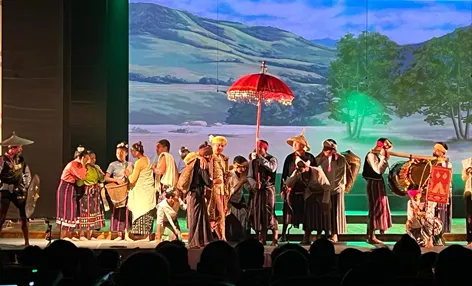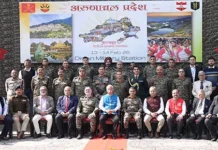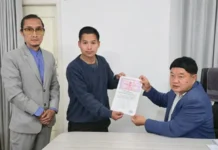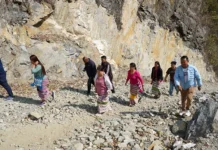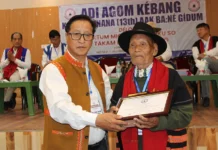[ Amar Sangno ]
ITANAGAR, 14 Feb: More than 70 artists performed in ‘Chowpha-Plang-Lu-Tai-Khamti Rebellion of 1839’ – a play directed by National School of Drama Assistant Professor Riken Ngomle, scripted by playwright Himanshu B Joshi, and adapted from a research article by Nepha Wangsa – which was staged at the Dorjee Khandu Convention Hall here on Monday.
The play, a part of the theatre festival titled ‘Unsung Heroes’, is an initiative of the state government to chronicle the valiant acts of heroes of different tribes who fought courageously against the British East India Company in Arunachal.
The play, which featured different Indian artists, including from Haryana and Assam, enthralled the audience and brought back the brave tales of the Khamti kings and the tribe’s way of life in early civilisation.
The play started with Tai-Khamti leader Phra Taka (played by Chow Mangno Longkan), a staunch follower of Lord Buddha, leading his followers and migrating from erstwhile Burma and becoming the ruler of Sadiya (presently in Assam) and Namtengna (Tengapani; presently in Arunachal). He was bestowed the title of Sadiya Khowa Gohain.
The title is named after great warrior Ronua Gohain, who fought and defended the Khamti territory against the British Army. The play chronicled how the Khamti kings battled against the Ahoms and the British to keep their territory intact.
In the climax, Ronua Gohain alias Chowpha-Planglu, played by Chow Pinthimang Namchoom, slays British officer Colonel Adam White (played by Duyu Tabyo. Colonel Adam’s death leads the British Army to mount a punitive expedition which is led by Captain Hanney. The injured Ronua Gohain is captured by the British Army and executed by Lieutenant Marshall.
Legend has is that Ronua’s decapitated head was taken to London by the British Army.
Actor Chow Pinthimang Namchoom, who played Ronua, attempted to bring out the emotion of king Ronua after having been defeated by the British Army. He depicted the pain of defeat and failure which Ronua had to go through after losing the battle, and the pain of being unable to protect his own people and motherland. However, at the end, Ronua dies an honourable death amid the misery.
Speaking to the press, Ngomle said: “Art creates good human beings. Through this play, our aim was to create good human beings.”
Retelling the history of Khamti warriors, Deputy Chief Minister Chowna Mein informed that the state government has decided to continue the theatre festival called ‘Arunachal Rang Mahotsav’ to promote arts and plays.
Chief Minister Pema Khandu, Home Minister Bamang Felix, ministers Tage Taki and Napak Nalo, and Padmashree awardee YD Thongchi also witnessed the play.

